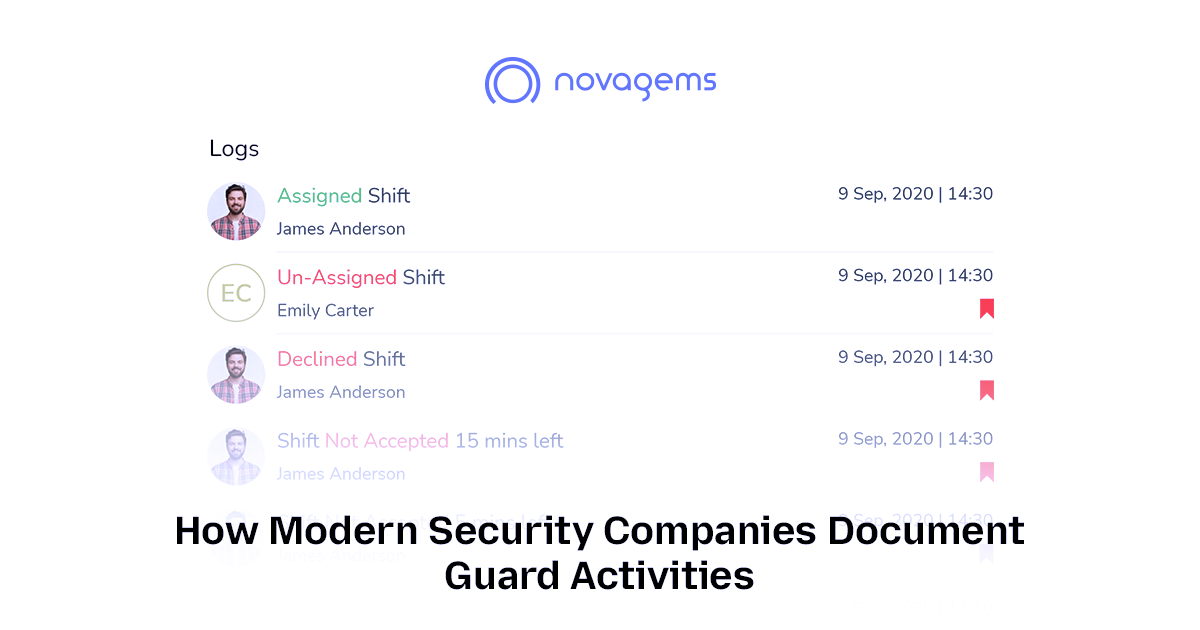How to Get a Security Business License in 2025: A Step-by-Step Guide
Tue, Sep 3, 2024
Read in 11 minutes
To run a successful security business you need to have a security business license. But how do you get one for your business? Learn the steps that are needed to get a secure business license and avoid any legal action.

If you’re thinking about starting your own security business, one of the very first things you’ll need is a security business license. Without it, you can’t legally operate, bid for contracts, or gain the trust of high-value clients.
In this guide, we’ll walk you through how to get a security business license step-by-step, including security guard company license requirements, training hours, state-by-state differences, and common mistakes to avoid.
Whether you plan to run a local security firm or a multi-state operation, this is your complete, easy-to-follow roadmap.
Key Takeaways
- You need a security business license to operate legally in most U.S. states.
- Licensing requirements vary—some states require 40+ hours of training, others require none.
- Applying involves setting up your business entity, meeting insurance/bonding requirements, and passing background checks.
- Security guard company license fees can range from under $100 to over $1,000 depending on the state.
- Using compliance tools or reminders helps avoid costly renewal lapses.
Why a Security Business License Matters
A security business license isn’t just paperwork—it’s the foundation of your company’s credibility, legal compliance, and ability to win contracts.
- Legal Compliance – Operating without a license can lead to fines, legal action, or being shut down.
- Public Trust – Clients are more likely to hire a licensed provider with verified credentials.
- Contract Eligibility – Many government and corporate contracts require proof of a valid security guard company license.
So you have decided to run your own security business. You have the whole plan ready - the guards, marketing, and the company name. But before you can launch your company, you need to take into consideration one key aspect too. The security license that you need to run your company. Starting a security business requires more than just expertise in security services. This license ensures that your business complies with legal standards, protecting both your company and your clients.
Now you must be wondering, “How to get security business license?". Do not worry, in this guide, we’ll walk you through why you need a security guard license, the types of licenses available, and the steps to ensure you have all the necessary documentation.
Why You Need a License to Start a Security Business
A business license is essential because it validates that your company is operating legally and adheres to industry regulations. Without a license, your business could face legal consequences, fines, and even closure. Additionally, many clients will only hire licensed security companies, as it gives them peace of mind knowing that they are working with a legitimate and compliant service provider.
Having a license not only helps you operate within the law, but it also boosts your credibility and allows you to compete with other professional security firms. Many states or regions have strict licensing requirements for businesses that provide security services, making it necessary to go through the proper channels to obtain this certification.
How to Get a Security Business License: Step-by-Step
Getting a security business license may seem like a daunting process, but breaking it down into clear, actionable steps makes it much easier to follow. This process ensures your company is legally compliant, credible in the eyes of clients, and ready to take on lucrative contracts. While exact requirements differ from state to state, here’s a detailed, step-by-step look at how to get a security business license in the United States.
1. Decide on Your Business Structure
Before you even think about filing for a security guard company license, you need to formalize your business entity. Common structures include:
- Limited Liability Company (LLC) – Most popular choice for small to mid-sized security companies because it provides personal liability protection while keeping tax filings relatively simple.
- Corporation (C-Corp or S-Corp) – Better for larger companies or those planning to seek investors.
- Sole Proprietorship – Not recommended for a security company, as it offers no liability protection.
Pro Tip: Choose a name that clearly reflects your security services and check that it’s not already in use or trademarked. Once your structure is decided, apply for your Employer Identification Number (EIN) through the IRS—it’s free.
2. Obtain a General Business License
Even though your primary focus is getting a security business license, most states and municipalities require you to hold a general business license first.
- This license is usually issued at the city or county level.
- You’ll typically need to provide your business name, address, ownership details, and pay a fee (often between $50–$150).
- This step shows local authorities you’re registered to operate as a business entity before moving into the more specialized security licensing phase.
3. Understand Security-Specific Licensing Requirements
This is where requirements vary dramatically. To get a security guard company license, you’ll generally need to:
- Be at least 21 years old (some states allow 18 for unarmed guard owners).
- Pass a comprehensive background check that includes FBI fingerprinting and a state criminal history review.
- Provide proof of liability insurance, often with minimum coverage of $1 million.
- Secure a surety bond in certain states, which acts as a financial guarantee to clients and the state.
- Demonstrate prior security or law enforcement experience—some states require 3–5 years in a management role.
Example: California requires an owner or qualified manager to have relevant experience or complete state-approved training before applying for the license.
4. Complete Training and/or Certification
Training is a major part of how to get a security business license, especially if you plan to employ armed guards.
- Unarmed Guards: States may require between 8 and 40 hours of training covering laws, ethics, patrol procedures, and emergency response.
- Armed Guards: Require firearms safety courses, live-fire qualification, and sometimes psychological testing.
- Owner/Manager Training: Some states also mandate the business owner or manager complete specific management or legal compliance courses.
5. Prepare Your Application
The security guard company license application package will usually ask for:
- Completed state application form.
- Proof of business registration.
- Proof of insurance and bonding.
- Training and experience certificates.
- Background check clearance.
- Application fee payment (can range from under $100 to over $1,000 depending on the state).
6. Submit and Await Approval
Submit your application to your state’s licensing authority (often the Department of Public Safety or a similar body).
- Processing time can be anywhere from 2 weeks to 3 months, depending on backlog and background check complexity.
- In some states, you may be called for an interview or a facility inspection before final approval.
7. Maintain and Renew Your License
Once you’ve secured your security business license, you’re not done.
- Most licenses must be renewed annually or every two years.
- Renewal requires proof of ongoing insurance coverage, updated employee rosters, and payment of renewal fees.
- Some states require continuing education or refresher courses to maintain eligibility.
Pro Tip: Use license management software or calendar reminders to track deadlines and avoid lapses.
Types of Security Business Licenses
When applying for a security license, it’s important to understand that different types of licenses may apply depending on the services your company offers. Here are some common types of security licenses:
- General Security Business License: This covers basic security services, such as providing unarmed guards.
- Armed Security License: If your business offers armed security services, you will need to apply for this specific license. Which often includes additional requirements, such as firearms training.
- Private Investigator License: Some security businesses may offer investigative services. In this case, a private investigator’s license may be required.
- Alarm System Installation License: For businesses that install security systems and alarms, an additional license may be necessary.
Each type of license has its own set of requirements, so be sure to research what applies to your specific business model. Once you have learned which license is required for security business, you can move on to the next step.
Other Important Things To Note:
Prepare Necessary Documentation
Once you’ve determined the type of license you need, the next step is to gather the necessary documentation. Proper preparation ensures a smoother application process.
Required Documents for Your Security Business License Application
The documents required for a security license can vary depending on your location, but generally, you’ll need:
- Business registration documents
- Proof of liability insurance
- Financial statements
- Tax information
- Any required industry certifications
Having these documents prepared ahead of time will make the application process more efficient and less stressful.
Filling Out Your Application Form
The application form is a critical part of the process. It’s essential to fill it out accurately and completely to avoid any delays or rejections. Here are a few things to keep in mind when filling out your application:
- Double-check all details: Ensure that all information, such as business name, contact details, and financial records, is correct.
- Include all necessary documents: Make sure to attach all the required documents as listed by your licensing authority.
- Pay attention to deadlines: Many applications have strict deadlines, so be sure to submit yours on time.
Pass Background Checks and Meet Other Requirements
In addition to completing your application, you will likely need to pass several checks and meet additional requirements before your license is approved.
-
Criminal Background Check Requirements
Most security guard licenses require the owners and key employees to pass a criminal background check. This ensures that individuals running the business do not have a criminal history that could disqualify them from providing security services.
-
Financial and Business Background Checks
Some licensing authorities may also conduct financial background checks to ensure that your business is financially stable and capable of handling operations responsibly. Additionally, a check of your business background may be conducted to confirm that you’ve previously complied with industry standards and regulations.
Proof of Identity, Experience, and Education
You may be required to provide proof of identity, including government-issued identification like a passport or driver’s license. Additionally, some states or regions require proof of experience or specific education related to the security industry, especially for those seeking an armed security license or private investigator license.
Character References
In certain cases, you may also need to provide character references. These are typically written by people who can attest to your honesty, reliability, and suitability for running a security business.
Tips for the Application Process
The security license application process can be complex, so here are a few tips to help you navigate it successfully:
- Start early: Begin gathering your documents and preparing your application well in advance to avoid last-minute delays.
- Stay organized: Keep all your documents, certifications, and proof of compliance in one place to ensure nothing is missing when it’s time to apply.
- Check local regulations: Requirements can vary significantly between states and regions, so be sure to check the specific laws in your area.
- Get help if needed: If the application process seems overwhelming, consider hiring a consultant or attorney who specializes in licensing to guide you through it.
Obtaining Permits
In addition to your security license, you may also need to obtain a specific security guard permit to operate legally. These permits can include:
- Local business permits: Depending on your city or county, you may need a general business permit or a special permit to operate a security company.
- Weapons permits: If your business provides armed security services, you’ll need the appropriate weapons permits for each guard.
- Alarm system permits: If your business installs alarm systems, you may need an alarm system installer permit from your local government.
Obtaining these permits ensures that your business complies with all local regulations, allowing you to operate without legal issues.
Get Set for The Next Step
So now that you have a bunch of licenses you are all set to take your business on the road. But did you know that there is one step that will help you along the way? And that is getting management software for your security officers that will help you manage your operations more smoothly. If you are confused about which one to take, then try out Novagems.
Here’s how Novagems features can assist with starting and running a security business effectively:
- Guard Scheduling and Management: Automate and manage schedules, shifts, and real-time location tracking for guards, ensuring smooth operations.
- Patrol and Incident Management: Utilize guard tour features to monitor patrols, receive real-time incident alerts, and ensure compliance.
- Automated Reporting and Analytics: Generate detailed reports on guard activity, attendance, and incidents to stay compliant with legal and operational standards.
- Client and Staff Communication: Improve transparency with instant communication channels between management, guards, and clients for better service quality.
Novagems helps streamline all aspects of security business operations, from compliance to daily management.
Conclusion
Obtaining a security business license is a crucial step in starting a successful security company. By understanding the types of licenses available, gathering the necessary documentation, and following the correct application procedures, you can ensure that your business is compliant with legal requirements and ready to provide trusted security services to clients.
Following these steps not only ensures you meet regulatory standards but also strengthensyour business’s credibility, helpingyou stand out in a competitive industry
Get a Free Trial
Sign up For Newsletter
Latest Blog Posts
Get Started
Start being productive & grow your business
with Novagems





